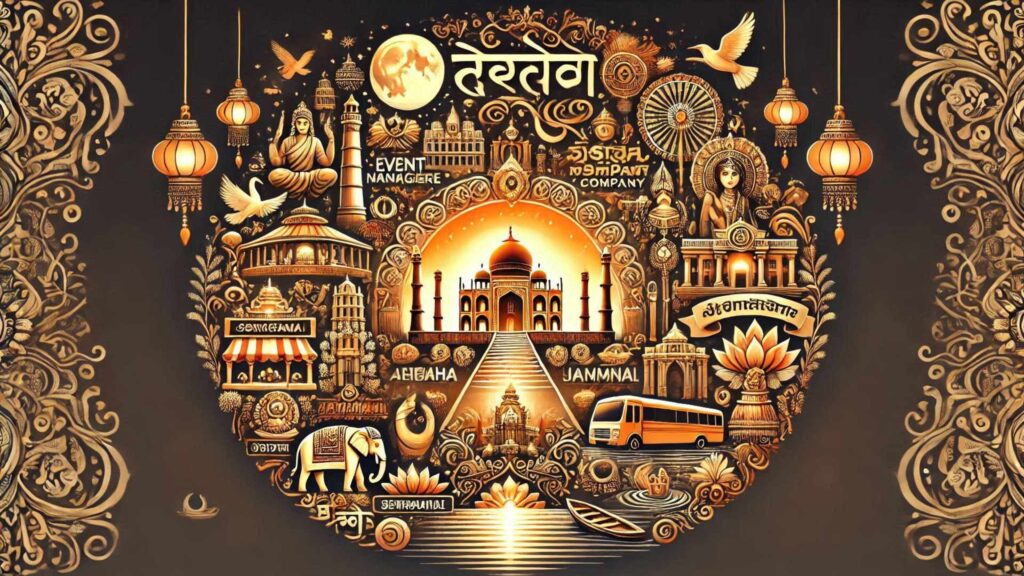100 Sanskrit Names for Event Management Company with Meanings
Introduction
In the dynamic Event Management Industry, where creativity, organization, and grand celebrations come together, a company’s name becomes its brand identity. Selecting a name in Sanskrit, the world’s oldest and most revered language, can lend your business uniqueness, cultural significance, and timeless appeal. Sanskrit names reflect harmony, beauty, success, and auspiciousness—core qualities that resonate perfectly with event planning, coordination, and celebration.
Read More About Ritual & Practices
This article provides 100 Sanskrit names along with their detailed meanings, carefully curated for businesses in the Event Management Industry. Whether you focus on weddings, corporate events, cultural festivals, or entertainment shows, these names offer depth and elegance to your brand.
List of 100 Sanskrit Names for Event Management Company

Names Representing Celebration and Festivity
- Utsava (उत्सव) – Festival or celebration.
- Mahotsava (महोत्सव) – Grand festival or large celebration.
- Ananda (आनन्द) – Joy, happiness, and bliss.
- Harsha (हर्ष) – Excitement, delight, and happiness.
- Pramada (प्रमदा) – Joyful celebration.
- Rangotsava (रंगोत्सव) – Festival of colors or joy.
- Parva (पर्व) – Special occasion or celebration.
- Samaroha (समारोह) – Ceremony or festivity.
- Ratotsava (रतोत्सव) – Joyous occasion.
- Mangalotsava (मङ्गलोत्सव) – Auspicious celebration.
Names Representing Harmony and Unity
- Sangati (संगति) – Togetherness or harmony.
- Samanvaya (समन्वय) – Coordination and synchronization.
- Sangam (संगम) – Union, meeting, or confluence.
- Sammelan (सम्मेलन) – A gathering or meeting.
- Yojana (योजना) – Planning or organization.
- Milana (मिलन) – Unity and coming together.
- Sakhya (सख्य) – Friendship and bonding.
- Ekta (एकता) – Unity or oneness.
- Bandhana (बन्धन) – Connection or binding.
- Samagati (समगति) – Gathering in harmony.
Names Representing Organization and Precision
- Niyojita (नियोजित) – Organized and systematic.
- Vyavastha (व्यवस्था) – Order, arrangement, or structure.
- Vinyasa (विन्यास) – Arrangement or design.
- Kalpana (कल्पना) – Imagination and creativity.
- Nirmiti (निर्मिति) – Creation and planning.
- Yukti (युक्ति) – Skill and precision.
- Anushasana (अनुशासन) – Discipline and organization.
- Sampada (सम्पदा) – Prosperity and resourcefulness.
- Sthapana (स्थापन) – Establishment and arrangement.
- Viksana (विक्षण) – Supervision and coordination.
Names Representing Beauty and Grandeur
- Shobhita (शोभिता) – Adorned and beautiful.
- Manorama (मनोहरमा) – Pleasing and delightful.
- Vilasita (विलसित) – Brightness and grandeur.
- Rajata (रजत) – Shining like silver.
- Hiranmaya (हिरण्मय) – Golden and radiant.
- Shobhana (शोभन) – Graceful and beautiful.
- Mohana (मोहन) – Charming and captivating.
- Sundaram (सुन्दरम्) – Beautiful and elegant.
- Chitralekha (चित्रलेखा) – Artistic beauty or design.
- Ratna (रत्न) – Gem; symbol of value and beauty.
Names Reflecting Light and Radiance
- Jyoti (ज्योति) – Light and radiance.
- Prakasha (प्रकाश) – Illumination and brightness.
- Deepa (दीपा) – Light or lamp.
- Divyajyoti (दिव्यज्योति) – Divine radiance.
- Chandra (चन्द्र) – Moon; calm and glowing.
- Surya (सूर्य) – Sun; eternal light.
- Anuprabha (अनुप्रभा) – Graceful glow.
- Rochana (रोचन) – Bright and shining.
- Vibhuti (विभूति) – Splendor and radiance.
- Arunima (अरुणिमा) – The glow of dawn.
Names Symbolizing Creativity and Art
- Kala (कला) – Art or talent.
- Natya (नाट्य) – Drama or dance.
- Sangeet (संगीत) – Music or harmony.
- Nritya (नृत्य) – Dance as an art form.
- Leela (लीला) – Divine play or art.
- Kavya (काव्य) – Poetic expression.
- Chitra (चित्र) – Art, painting, or design.
- Varnika (वर्णिका) – Expression through colors.
- Shristi (सृष्टि) – Creation and creativity.
- Abhinaya (अभिनय) – Acting and performance.
Names Inspired by Nature
- Pushpa (पुष्प) – Flower; beauty and delicacy.
- Vasanta (वसन्त) – Spring season; vibrancy.
- Taraka (तारक) – Star; symbol of brilliance.
- Nirjhari (निर्झरी) – Waterfall; symbol of flow.
- Ambara (अम्बर) – Sky; vastness and beauty.
- Ratnakara (रत्नाकर) – Ocean of gems.
- Aranya (अरण्य) – Forest; calm and abundant.
- Vrishti (वृष्टि) – Rain; symbol of blessings.
- Kusuma (कुसुम) – Blossom or flower.
- Surabhi (सुरभि) – Fragrance of flowers.
Names Reflecting Time and Rhythm
- Samaya (समय) – Time; essential for planning.
- Kshanika (क्षणिक) – Moment or fleeting time.
- Kalchakra (कालचक्र) – The wheel of time.
- Muhurat (मुहूर्त) – Auspicious time.
- Samvatsara (संवत्सर) – A year; importance of time.
- Prarambha (प्रारम्भ) – Beginning or commencement.
- Kala (काला) – Rhythm and art.
- Sthiti (स्थिति) – State or stability.
- Kramika (क्रमिक) – Sequential or orderly.
- Yugma (युग्म) – Pair or synchronization.
Names Reflecting Auspiciousness and Grace
- Shubham (शुभम्) – Auspicious and positive.
- Mangalam (मङ्गलम्) – Prosperous and sacred.
- Kalyanam (कल्याणम्) – Auspiciousness.
- Sumangali (सुमङ्गली) – Blessed and fortunate.
- Pavitra (पवित्र) – Pure and sacred.
- Namana (नमन) – Reverence and respect.
- Shraddha (श्रद्धा) – Trust and devotion.
- Bhavya (भव्य) – Magnificent and grand.
- Shriya (श्रिया) – Grace and prosperity.
- Divya (दिव्य) – Divine and radiant.
Additional Unique Sanskrit Names
- Ananta (अनन्त) – Infinite and boundless.
- Samarpan (समर्पण) – Dedication and offering.
- Devanjali (देवान्जलि) – Divine offering.
- Pratibha (प्रतिभा) – Creativity and brilliance.
- Vishranti (विश्रान्ति) – Rejuvenation and rest.
- Aarohi (आरोहि) – Ascending to greatness.
- Amrita (अमृत) – Nectar; eternal grace.
- Dhruva (ध्रुव) – Constant and unchanging.
- Sharvani (शार्वणी) – Eternal energy.
- Viksara (विक्षर) – An everlasting flow.


